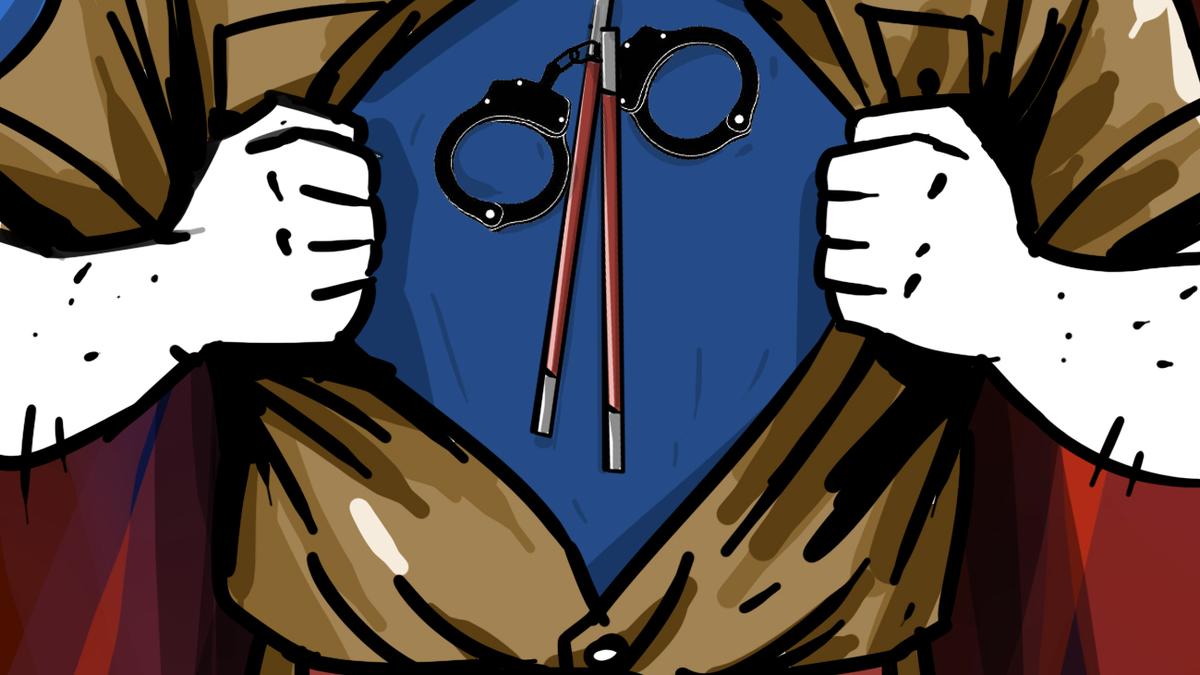Even as the Global Week Against Torture was being observed, newspapers reported on June 25 that a constable was suspended for assaulting three women inside a police station in Tiruvallur district of Tamil Nadu. Another report on the same day published an order of the State Human Rights Commission in V. Priyadharshini vs K. Santhamoorthi, directing the State to pay ₹50,000 as compensation for human rights violation by Santhamoorthi, who, as Inspector of Police, C2 Race Course police station, Coimbatore City, disrespected and harassed a woman complainant.
On the same day, The Hindu reported about the “threat of moral policing shadowing young couples in Chennai’s public spaces”. These are just a sample of the excesses committed by the police in their routine everyday interactions with the larger public, especially women.
V. Kanadasan, SHRC Member, in the order in the Coimbatore case, quoted Section 58 of the Police Act, 2006, enunciating the social responsibilities of the police, assigning special duties with regard to the vulnerable sections of society: “Behave with the members of the public with due courtesy and decorum, particularly in dealing with senior citizens, women and children. Ensure that in all situations, especially during conflict between communities, classes, castes and political groups, the conduct of the police is always governed by the principles of impartiality and human rights norms, with special attention to protection of weaker section including minorities. Preserve, promote and protect human rights and interests of weaker sections, backward classes, poor, weak and the downtrodden.”
Hence, the duty of the police officials is to behave with the members of the public with due courtesy and decorum. The higher officials in the Police Department may be well-mannered and well-trained to behave courteously. But they are not available for interactions with the general public.
In 1998, a 21-year-old homemaker, Chitra, was found dead after being taken to the Aminjikarai police station in Chennai at night for investigation of an offence of theft allegedly committed by her husband, Ravi. She was humiliated at the station. After her death, the then City Police Commissioner had initiated sensitisation training for all police personnel and it percolated to the entire State police force.
Rude, inhuman
As an advocate, I have personally visited various police stations. My experience is that it is a hierarchical place that is drunk with power. The personnel view complainants as a nuisance and a spoke in their wheels. The accused are seen as inhuman slaves at their mercy. The words spoken are generally insulting, rude with no respect or culture. There is an atmosphere of fear that makes people afraid of stepping into a police station.
Policemen generally think that they are above the law. They are still in a colonial mindset. They are more adept at protecting the elite and more dutiful in maintaining law and order at the cost of the common man. They stop the entire traffic, even ambulances, to give way for a VIP convoy on roads. Crime investigation and victim justice are not their priority. Policing have turned against the common man’s interest and dignity. Pedestrians, two-wheeler users and autorickshaw drivers are at their receiving end forever on the roads as the policemen vent their power and authority on them using vulgar language and physical intimidation. It is just not custodial violence or murder but torture simpliciter.
Even as we find fault with the functioning of the policemen on duty at the police stations and outside, it is essential that we look at and advocate reforms. While the higher police officers are educated, trained and protected by service laws, the lower officials are definitely exposed to all imaginable vagaries. They are on duty round the clock, with very little rest or humane conditions of service. They are treated with contempt by the superior officers, politicians and the rich and powerful.
As early as 2006, the Supreme Court in the Prakash Singh judgment has suggested wide reforms in the police. One of the most important reforms suggested is separation of investigation and law-and-order wings. In 2010, the Common Wealth Human Rights Initiative, in one of its report on “Seven steps to police reforms”, said the problem was “Investigations are poorly mounted, slow, done by inadequately trained and unspecialized staff and frequently subject to manpower deflection into other pressing law and order duties”. “Both investigation and law and order are vital and specific police functions. In order to encourage specialization and upgrade overall performance, the Court has ordered a gradual separation of investigative and law and order wings, starting with towns and urban areas with a population of one million or more. It is felt that this will streamline policing, ensure speedier and more expert investigation and improve rapport with the people,” it said.
Abandoned experiment
As the police were seen with suspicion and not as part of the community for whose welfare they exist, in 1993, Philip V. Prateep, an IPS officer, founded the Friends of Police (FoP), a community policing initiative in Tamil Nadu. It was to focus on promoting crime awareness, preventing crime, and enhancing fairness and transparency within the police force. But sadly, it was disbanded in 2020 after allegations of its members abusing their powers.
The need of the hour is to ensure that the police force is revamped with sensitive, friendly, and honest people. Reward the best ones publicly, promote constant people-friendly interactions with the local police and citizens of the neighbourhood. A few years ago, in every zone, there used to be a police-citizens meet which was attended by the Deputy Commissioner in charge of the locality and police officers from every police station in the zone. It gave room for healthy interaction and introspection. With CCTV cameras and smartphones in everyone’s hand, the police could be harnessed and sensitised to have a human face with compassion and empathy.
sudharamalingam1@gmail.com
Published – July 13, 2025 03:56 am IST
